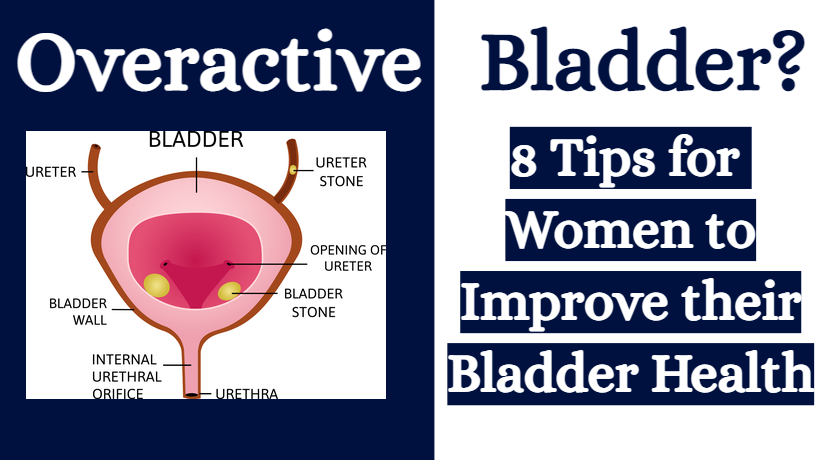Staying on top of our health encompasses almost every aspect of our daily lifestyles. For many women, eating healthy, staying hydrated, doing self-care practices, and exercising are part of our weekly routines to fulfill healthy living. For many women, however, bladder health goes unnoticed, even though it is a crucial part of our overall health.
Most women do not know much about their bladder, and staying in the dark about your bladder health can lead to more issues than you would like. In comparison to men, women are 30 times more likely to develop a UTI. Additionally, around 30 to 40% of women in the U.S. are currently living with overactive bladder issues; some experts estimate it can be more, as many living with the condition do not recognize these symptoms or are too afraid to ask for help.
Caring for your bladder is just as important as caring for any other part of your body. Here are some everyday tips to make sure you are keeping your bladder health in check.
Monitoring your stress level
When you’re stressed out, the stress can affect your body in a number of ways. It can lead to migraines, tense muscles, and sometimes even sickness. The pelvic floor may become tensed up as a result of consistent stress which can lead to possible bladder dysfunction. Even though you may think it is unlikely, keeping your stress levels in check can do your body good and keep your bladder healthy.
Staying hydrated
Everyone is told to drink plenty of water throughout the day. It is especially important for women to stay hydrated, as it flushes out the bacteria that may accumulate in your bladder throughout the day. For women prone to developing UTIs, staying hydrated is the number one way to prevent infection and irritation. Flushing this water out as well is equally as important, as many experts recommend limiting your fluid intake at least two hours before bed so as to not disturb your night. Those with overactive bladders may suffer frequent bathroom trips both during the day and night. Just as hydration is key, spreading your water intake throughout the day can also be key to prevent sudden urge symptoms.
Don’t hold in
Holding in your urine can do immense damage to your bladder if you are not careful. If held in for too long, it could weaken the muscles and lead to further dysfunction, such as kidney damage, so make sure to go at least every three to four hours. UTI’s can also form if the bladder is held in for too long, as the bacteria is not being properly flushed out.
Avoid bladder irritants
Dehydration is typically associated with the development of bladder issues, however, did you know that your diet can play a strong role in the health of your bladder? Certain drinks and foods are more prone to cause bladder irritation, making the bladder spasm, or having a sudden, urgent need to urinate or it can cause leakage. Cleveland Clinic advises avoiding excessive consumption of these beverages:
- Coffee (caffeinated and decaffeinated)
- Tea
- Sodas and carbonated drinks
- Alcohol (particularly beer)
Additionally, you should try to eat these foods only in moderation
- Citrus fruits (oranges, grapefruits, lemons, and limes)
- Tomato based products (ketchup, sauce)
- Spicy foods and chili
Start off your day with 8 oz. of water
Instead of your usual coffee, orange juice, or tea, why not start your day off with some water? Experts recommend drinking at least 8 fluid ounces of water in the morning to dilute your bladder. Not only are you swapping for a much healthier morning beverage, but it creates a stable bladder to prepare for the rest of your day when it comes to eating and drinking.
Preventive medicine
If you are someone who is prone to developing UTIs, talking to a professional could help in preventing them. For older women, this may be a hormone related issue, and doctors may prescribe estrogen cream to help balance out vaginal pH. For women of all ages however, cranberry tablets can help in cleansing the bladder. A chemical found in cranberries can help in preventing bacteria buildup in the bladder.
Pelvic floor exercises
Pelvic floor exercises or “kegel” exercises are renowned for helping individuals train to hold urine in the bladder. For women, many factors can lead to damage of the pelvic floor, the most prominent being pregnancy and childbirth. According to the National Institute on Aging, a doctor may be able to identify specific target areas, and may recommend suitable kegel exercises to help strengthen the pelvic floor by tightening it.
Get plenty of fiber
Fiber can benefit your body in a number of ways, but it is probably most known for its ability to help with preventing and alleviating constipation. Large amounts of stool in the colon can actually place pressure on the bladder, which can strain it and lead to damage. To prevent this, make sure you are incorporating plenty of whole grains, vegetables, and fruits into your diet.



